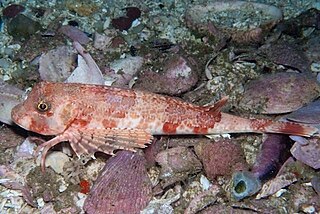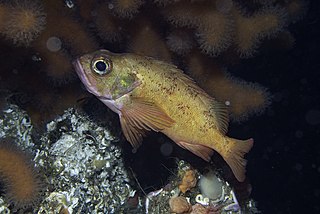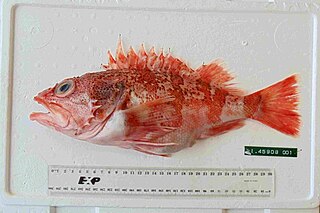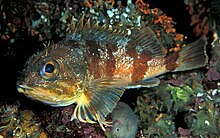
Scorpaena cardinalis, the eastern red scorpionfish, grandfather hapuku, cardinal scorpionfish, Cook's scorpionfish, Cook's rockcod, Kermadec scorpionfish, Northern scorpionfish, red scorpion fish, red scorpion-cod or Sandy-bay cod, is a species of marine ray-finned fish belonging to the family Scorpaenidae, the scorpionfishes. It is found in the southwestern Pacific Ocean.

Helicolenus is a genus of marine ray-finned fishes belonging to the family Scorpaenidae where they are classified within the subfamily Sebastinae, the rockfishes. The species in this genus are found in the Indian, Atlantic and Pacific oceans.

Brachypterois serrulata, the sawcheek scorpionfish or pygmy lionfish, is a species of scorpionfish native to the northwestern Pacific Ocean.

Rhinopias frondosa, the weedy scorpionfish or the weed fish, is a species of marine ray-finned fish belonging to the family Scorpaenidae, the scorpionfishes. This species is found in the Indo-West Pacific. It is a rare but highly desirable fish in the aquarium trade.

Parascorpaena picta, the northern scorpionfish, painted scorpionfish or marbled rock cod is a species of marine ray-finned fish belonging to the family Scorpaenidae, the scorpionfishes. This species is native to the Indian Ocean and the western Pacific Ocean. This species grows to a length of 16 centimetres (6.3 in) TL.

Scorpaena papillosa, the red rock cod, Southern red scorpionfish, chained scorpionfish, common red gurnard, Southern red scorpioncod, Southern rockcod or dwarf scorpionfish, is a species of venomous marine ray-finned fish belonging to the family Scorpaenidae, the scorpionfishes.

Helicolenus dactylopterus, blackbelly rosefish, bluemouth rockfish, and bluemouth seaperch, is a species of marine ray-finned fish belonging to the subfamily Sebastinae which is classified within the family Scorpaenidae. This Atlantic species is a typical sit-and-wait predator with a highly cryptic coloration.

The western scorpionfish, also known as the neglected scorpionfish, is a species of marine ray-finned fish belonging to the family Scorpaenidae, the scorpionfishes. It is found in the western Pacific Ocean.

Platycephaloidei is a suborder of ray-finned fishes, part of the order Scorpaeniformes, and includes the flatheads, ghost flatheads and sea robins.

Neosebastidae, the gurnard scorpionfishes or gurnard perches, is a small family of deep-sea ray-finned fishes. It is part of the suborder Scorpaenoidei within the order Perciformes. These fishes are found in the Indian and Pacific oceans. Several of the species in this family are venomous.

The Cape gurnard is a species of marine ray-finned fishes belonging to the family Triglidae, the gurnards and sea robins. This species is found in the southeastern Atlantic Ocean and the southwestern Indian Ocean. This species is of commercial importance as a food fish.

Helicolenus hilgendorfii, Hilgendorf's saucord, is a species of marine ray-finned fish belonging to the subfamily Sebastinae, part of the family Scorpaenidae. It is found in the northwestern Pacific Ocean.

Sebastes joyneri, the Togot seaperch, offshore seaperch or joyner stingfish, is a species of marine ray-finned fish belonging to the subfamily Sebastinae, the rockfishes, part of the family Scorpaenidae. It is found in the northwestern Pacific Ocean.

Sebastes viviparus, the Norway redfish, small redfish, lesser redfish, ocean perch or rosefish, is a species of marine ray-finned fish belonging to the subfamily Sebastinae, the rockfishes, part of the family Scorpaenidae. It is found in the northern Atlantic Ocean.

Helicolenus barathri, the bigeye sea perch, bigeye ocean perch, coral cod, coral perch, red gurnard perch, red perch or red rock perch, is a species of marine ray-finned fish belonging to the subfamily Sebastinae, part of the family Scorpaenidae. It is found in the southwestern Pacific Ocean.

Scorpaena jacksoniensis, the Eastern red scorpionfish, Billy Bougain, cardinal scorpionfish, coral cod, coral perch, Eastern red scorpioncod, fire cod, Northern scorpionfish, ocean perch, prickly heat, red rockcod or red scorpion-cod, is a species of marine ray-finned fish belonging to the family Scorpaenidae, the scorpionfishes. It is found in the south western Pacific Ocean.

Scorpaenodes guamensis, the Guam scorpionfish or common scorpionfish, is a species of venomous, marine, ray-finned fish belonging to the family Scorpaenidae, the scorpionfishes. It has a wide Indo-Pacific distribution.

Pterois paucispinula is a species of marine ray-finned fish belonging to the family Scorpaenidae, the scorpionfishes and lionfishes. It is found in the Western Pacific Ocean.
Pterygotrigla multiocellata, the antrorse spined gurnard, is a species of ray-finned fish belonging to the family Triglidae, the gurnards and sea robins. This fish is found in the Indo-Pacific region where it has been recorded from Japan, Saipan, and the eastern and western tropical waters off Australia.

Pterygotrigla polyommata, the latchet, butterfly gurnard, flying gurnard, lachet gurnard, pastry, sharpbeak gurnard, spiny gurnard or spinybeak gurnard, is a species of marine ray-finned fish belonging to the family Triglidae, the gurnards and sea robins. It is found in the southeastern Indian and southwestern Pacific Oceans.




















